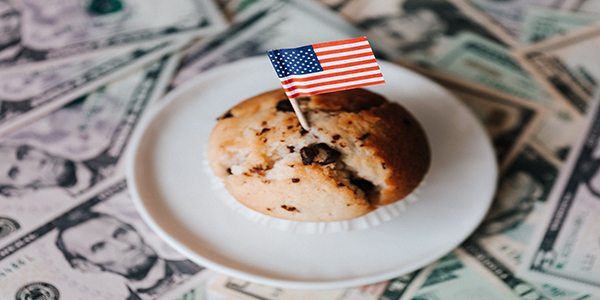 |
||||||||||||
|
||||||||||||
| Is Google Chopping Up Ad Business to Dodge Antitrust Lawsuit? |
 |
| Hocus pocus. It's looking like Big G is attempting to make a second lawsuit coming from the DOJ magically disappear with the wave of a wand. The latest tea suggests that Google offered to break off pieces of their ad tech business into a separate entity under Alphabet. At this point, there's been no inclination that such a proposal would satisfy the DOJ, especially since the department's antitrust chief, Jonathan Kanter, says he'd rather litigate than accept settlements. Sources claim the DOJ is putting together a lawsuit accusing Google of blocking competition in the ad tech business. Nearly two years ago, we talked about how many conflicts of interest, questionable practices, and unreasonable challenges publishers face dealing with Google's ad tech business. And today, these issues are lingering. |
| Google takes an agile approach when responding to just about every one of these lawsuits, which has only proven that they're masters at the art of attracting more bees with honey. If you remember, just a few weeks ago, Google made moves to open YouTube advertising to other DSPs. "Google's willingness to offer concessions to avoid a U.S. lawsuit is an evolution of the company's strategy for handling growing legal and regulatory pressure," the WSJ reports. As we all know the duopoly — Google and Facebook — even in the face of declining revenues still bring in a larger share of ad spend than anyone else. The Government's argument has been that the two businesses have an unfair advantage that limits competition, and the tech giants were even caught colluding to shut out competitor ad exchanges and divvy up advertising profits. With that said, the advertising component of Alphabet's business is likely valued at tens of billions of dollars. Google is projected to generate $174.81 billion in net digital ad revenue worldwide, up 17.3%, in 2022, according to eMarketer. That gives it a 29.0% share of the worldwide digital ad market. Facebook is second with a 21.4% share. This year, Google will remain head honcho in worldwide search ad revenue with $142.30 billion, about 59.4% of the global search ad market. The display business is not that different, with eMarketer estimating that Google's display business will grow to $32.51 billion, giving it a 9.6% share of global display spending. Would spinning off a separate ad unit under Alphabet really be much of a concession for the company? One has to wonder. |
| How Is Inflation Shaking up Ad Spend? |
 |
| Inflation is getting on everyone's nerves right now, and while parts of ad tech are still booming, there have been a few shifts in the space now that everything is going up in price. "Inflation is just one element. It goes hand-in-hand with the last few years. COVID accelerated eCommerce and the digital world for many companies," Matt Mierzejewski, SVP of Search at Merkle told SearchEngineJournal recently. "There's a greater scrutiny on the investments in companies. They are trying to beat the market and the competition. There's pressure for leaders to be tied into the data and marketing measurement," he added Another thing marketers are finding is that with inflation, there can sometimes be a natural rise in revenue, but sometimes it is a trick. For example, if your sales increase by 10%, but you spent 15% more on advertising or COGs, there is no real profit. |
| If past recessions could be used as an indicator, then it would be safe to presume that digital spending would have more of a buffer than other forms of media investment, particularly brand advertising. “We believe platforms that are focused on performance advertising and can prove ROI will be more resilient than those focused on hard-to-measure brand-building capabilities,” MoffettNathanson analysts wrote in a May research note. But what worked once, won't always work again. For example, at the height of the Pandemic, advertisers were canceling left and right without penalty, especially putting direct deals on pause. But ad tech vendors and publishers might not be so nice about things this go around. Publishers who have a better handle on their first-party data and can shape a clear narrative about the value of their audience will have a better time weathering the coming storm. We don't expect another race to the bottom, but instead, advertisers are placing their bets where they know they'll see a bigger return. That's why analysts are predicting the continued rise of commerce media. As well, some marketers are shifting their spend to influencer marketing, so that's one key area where pubs can sink their teeth into. |
| Trusted Media Brands Convinces Advertisers to Dump Third-Party Cookies |
 |
| We've often said that the third-party tracking cookie has outlived its usefulness. And now some publishers are proving this to be true. As of late, Trusted Media Brands noticed significant revenue increases that they're crediting to their first-party data investments. They're leveraging their first-party data to win more pitches and shift brands away from their reliance on third-party data. "We are having educated conversations with buyers saying, 'What you're doing won't work a year from now,'" said Stephanie Mazzamaro, data product, and operations VP. "If what we're seeing is accurate, we can move you to a programmatic guaranteed deal; we can provide deeper insight." With cookies going away any day now, TMB's strategy assists ad buyers with saving money by switching to programmatic guaranteed channels. With an assist from Permutive, TMB accesses data points surrounding campaign performance and revenue gained in the open marketplace — to identify potential clients it can transfer to its own programmatic guaranteed channels. |
| Pubs are scrambling to find the best ways to make ends meet, and ultimately they're seeking to alleviate revenue loss in the open exchange in ways that complement privacy issues. "It may help publishers to continue demonstrating the value of their inventory. It may also help marketers and agencies to make informed decisions," said Mazzamaro. "But marketers and agencies will continue to refine their decisions based on outcomes and not based on insights." We've heard similar stories from publishers like Digital Trends and Insider Inc., who are also now playing a more consultative role with buyers since investing more heavily in their first-party data strategies. In TMB's case, their request for proposal win rate has increased by 31%. And now 94% of direct-sold campaigns use first-party data. If that's not good for a publisher's revenue business, then we don't know what is. |
| Around The Water Cooler |

I
|
We're tapped into this as well...
|









